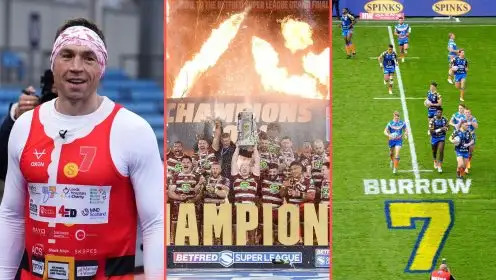In depth: Shaun Edwards

There is a specific number that stands out above the rest when you look at the career of Shaun Edwards and that is 37, 37 winner medals in one of the most standout resumés in rugby league history.
A born winner and leader, Edwards has proven it all at player and coaching level in both codes and throughout history we know it takes a special kind of player to do just that. A witty nature combined with a ruthless ambition to succeed reflected on his style of play with the term failure never an option.
There is a substantial amount that can be made of the dynasty that was the intimidating Wigan side of the 80s and 90s.
We could talk about the feats, the ‘Gang of Four’, becoming one of the first full-time professional rugby league clubs and even their style of play time and time again. But one thing we shall do here is take an in depth look at the impact of which Edwards made at the club especially when you look to the time before his signing, Wigan were in a midst of a major title drought.
However, between the years 1983 and 1997, the former Great Britain international cemented himself as a lynchpin figure, one that could steady the ship on those rocky waters.
Born and raised in Wigan, Lancashire, Edwards spent the majority of his highly accomplished career playing for his hometown club, enduring his most profound success. It is fair to say though that through any sport, from time to time we see a notion used when it comes to seeing a young player come through the cracks as a potential prospect.
We see a statement used along the lines of ‘this player is the next big thing’ or ‘this player is the next (insert former player here)’.
Although, in some instances, we see ones never live up to hype and plenty of names could be included on that list. However, it some cases it can fold out to be more than a truer tale and we see this generational talent unfold throughout their career becoming an elite player before our very eyes and Shaun Edwards was just that.
Even from an early age turning out and captaining both the England rugby league and union schoolboys, he excelled with a plethora clubs taking note of the youngster. Only fitting that it was Wigan that came calling by securing the services of the 17-year-old in 1983 for £35,000, a record fee for a schoolboy at the time.
Looking back to the time before Edwards’ signing for Wigan, the Lancashire outfit were in a fit of a rejuvenation or a rebuild you could say.
The 1980 season had seen the club relegated from the elite division for the first time in the club’s history and despite an instant return to the top flight along with a Regal Trophy win in 1983, a major title was still out of reach.
However, the arrival of Maurice Lindsay’s arrival eventually brought with it an upturn in fortunes as the Cherry and Whites became one of the first full time professional rugby league clubs and behind the scenes it felt now as if strings were being pulled, handshakes were being made and recruitment was becoming top priority.
So, after a Challenge Cup win in 1985, their first major title since 1965, it looked to have signalled a call to arms as we were given a sense that this Wigan side starring Edwards and a selection of overseas and homegrown recruits was starting to rise from a forgotten pile of ashes.
The win saw Edwards place his name on the scoresheet with a try in one of the great Challenge Cup finals.
Now, a fair amount can be said of a player who is able to bounce back from drops in form. We see so many common occurrences where players are said to be just ‘flashes in a pan’ or are unable to find a spark they once had after a poor run of form.
However, even despite an ominous two game spell with Australian side Balmain in 1989, the then grand finalists, it did nothing to knock the confidence of one of the country’s most continuously rising stars.
A return to Wigan followed and what would follow was one of the most remarkable runs of dominance in the club and sports long and storied history.
The 1989-90 season saw Edwards step up from being a crucial piece in Wigan’s side to what we can define as a world beater and place himself among the upper echelons of the rugby league playing elite.
That season saw Wigan come out on top once again to claim another RFL Championship and Challenge Cup (their third in a row), with Edwards putting forth a season to remember claiming the Man of Steel award for his outstanding efforts.
It showed not only what made him one of the league’s most creative players but also one of the toughest, playing most of the Challenge Cup final with a broken cheekbone and eye socket.
The success train did not stop there as Edwards continued to produce the performances of what placed him amongst the sport’s best, becoming a noteworthy try scorer on constant occasions.
By the end of the 1991-1992 season he finished as the league’s top try scorer with 40, including a 10 try blitz in the 78-0 drubbing of Swinton in the Challenge Cup. A performance that tied Martin Offiah’s club record for most tries in a single match by a Wigan player.
Edwards 10 try video embed code
As mentioned before failure never seemed to compute in the dazzling halfback’s mindset and what made the extraordinary run of Wigan’s eight consecutive Challenge Cups between 1988 and 1995 all the sweeter was that Edwards played in every single cup tie through those years. This was not only an achievement in itself but showcased the longevity and durability of such a fine player.
We can talk about his achievements at domestic level until we go blue in the face but his exploits at international level will forever be remembered.
In 1985 at the tender age of 18 he made his debut for Great Britain against France before going on to represent Britain on 36 occasions scoring 15 tries. Overall, he went on to star in three World Cups for both Great Britain and England, reaching the final on two occasions in 1992 and 1995 and as captain in the latter.
He left Wigan and moved on to London Broncos in 1997.
A total of 467 appearances and 292 tries scored, Edwards produced a glittering 14-year career with the Warriors, that included an impeccable record of eight Championships in 10 years, nine Challenge Cups in 11 years (11 finals in total), three World Club Challenges, five Lancashire County Cups and six Regal Trophies.
After one season with the Broncos, Edwards moved on to Bradford Bulls in 1998 before rounding out his career with a return to London and in the end bringing the curtain down on a phenomenal 17-year rugby league career.
Now, being inducted into the Rugby League and Wigan Hall of Fame is only a fitting tribute to one of the great rugby league players the sport has produced. A player who oozed a certain cheekiness in his game but was able to modify and bring with it, true determination to succeed.
We talk of warriors and generational talents in this beloved sport, guys willing to lay it all out there in an attempt to win and we saw that here.
A bonified superstar, a true leader, a cross code wizard and jack of all trades whether it be creating, scoring, defending or with the kick of the boot, Edwards displayed it all. He is not just a rugby league legend, he is a British sporting great and one of the fiercest competitors to step on a rugby field.



